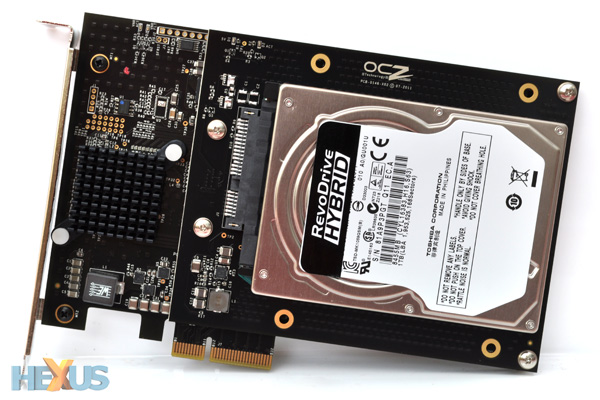Final thoughts and rating
The benchmarks tell most of the story, but it's in the real world that the RevoDrive Hybrid best shows its potential.
After a few days of use, our test platform is visibly nippy, with Windows booting quickly and applications loading almost instantly. It's difficult to tell that a 1TB mechanical hard disk is acting as the primary storage device, and it very much feels like an SSD-based system.
The responsiveness and speed is testament to the Dataplex caching algorithms, and it shows that this is a Hybrid solution that can deliver on its promise of blending performance and capacity at a reasonable cost-per-gigabyte.
Sure, it's considerably cheaper to pick up a high-end 120GB SSD and a 1TB hard disk and then manage the data between drives independently, but OCZ's Hybrid is designed to be a more convenient all-in-one solution - and in some ways it is.
Potentially getting RevoDrive-like performance for up to 1TB of data is the key selling point, and the amalgamation of mechanical disk and NAND flash memory makes a lot sense. Hybrid solutions, for the foreseeable future, are probably the way forward for high-performance, high-capacity storage, but the RevoDrive is a first-run product, and it carries a fair number of provisos that make it feel like an incomplete concept.
Right now, the drive only supports Windows 7 and requires specific drivers and software to function. There's no option to upgrade the attached hard disk, and the RevoDrive won't serve as a cache for any additional storage devices should you decide to increase system capacity at a later date. It also requires a bit of faith, as there's no user control over the cache, so while our time with the drive has established that it works well, there's no guarantee that'll it'll speed up every operation.
As a result, this storage solution - despite its merits - isn't nearly as flexible as a standard SSD and serves a very niche requirement. Enthusiast users will likely stick to the guaranteed performance of SSD-only solutions, while consumers seeking a combination of value and performance will in our estimation remain best served by a low-cost SSD and a cheap-and-cheerful hard disk.
Bottom line: the RevoDrive Hybrid is quite possibly a glimpse at the future of high-speed, high-capacity storage, but right now, its limitations are such that it's difficult to recommend.

The Good
Clever mix of performance and capacity
Cache can deliver SSD-like speed in ideal scenarios
The Bad
Only compatible with Windows 7
Limited upgrade paths
HEXUS Rating

OCZ RevoDrive Hybrid (1TB)
HEXUS Awards

OCZ RevoDrive Hybrid (1TB)
HEXUS Where2Buy
The reviewed 1TB OCZ RevoDrive Hybrid is available to purchase from SCAN.co.uk*.
HEXUS Right2Reply
At HEXUS, we invite the companies whose products we test to comment on our articles. If any company representatives for the products reviewed choose to respond, we'll publish their commentary here verbatim.
*As always, UK-based HEXUS.community forum members will benefit from the SCAN2HEXUS Free Shipping initiative, which will save you a further few pounds plus also top-notch, priority customer service and technical support backed up by the SCANcare@HEXUSforum.













